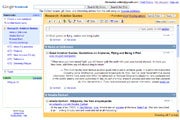Sent to you by ckstevenson via Google Reader:
Online gaming has a meaningful role to play in business. At IBM, for example, we are exploring the use of 3-D Internet technology to enable better understanding of complex business processes and systems architecture. Why turn to computer games for such insight, you might wonder. I use the analogy of automobile engines.
These days, engines are more complex than ever, but that complexity is often masked by a plastic cowl over the crankcase and key electronic parts. Most drivers will never remove the cowl, but they will depend on the vehicle to get them around town. Similarly, many business people depend on their HR, procurement, and sales systems to run their company, but do not understand how they actually work. For leaders in large multinational firms making strategic investment decisions for growth, mergers and divestitures, the complexity can be overwhelming.
The computer simulations we are exploring at IBM allow people to visualize our processes as a "participant" in the process itself. Inspired by the classic Harvard Business Review article, "Staple Yourself to an Order," and mashing this idea up with the concepts from movies like "Fantastic Voyage" and "Honey, I Shrunk the Kids!" we have created an environment for strong collaboration that has yielded some tangible and valuable business insight to the participants. Seeing a chart that says there are multiple methods to process a customer order is one thing. Positioning yourself as a potential order and then deciding which route to take as that order yields a far richer understanding.
Here's how it would work. Via the simulation, you might board a virtual "tour bus" that allows you (and your colleagues) to experience the order management process firsthand. Imagine boarding the order bus and heading down the customer path. Your guide explains that for this trip, the order is from an Italian premier customer for the just announced Widget2008 product. As the order progresses from quote to firm order, you reach a roundabout where multiple fulfillment paths might be selected. Since this order is from a premier customer, the order continues down the "expedited fulfillment" path. At this point, one of your fellow passengers on the bus asks what might be different if the order was placed by a Taiwanese customer for Widget2007 instead. The bus instantly returns to the starting point, and the differences between Italy and Taiwan are experienced directly, with every twist in the road noted, and a discussion between the passengers on the bus ensues about how the differences in processes could be simplified and globally integrated.

A further benefit of the 3-D Internet space is that on the bus, everyone has the view of the driver out the front window – not the back of the person's head in front of them – since the 3-D Internet is not limited by the physics and physical structure of the "real world." When real people get together virtually and experience the process of an order, they develop a common understanding of the company's systems landscape and the challenges it presents.
Might you see how the benefits of such 3-D Internet worlds could help you be a more effective change agent for your organization? For instance, would helping your business and technical team members quickly understand the nature of the complexity built into the systems supporting them help your leaders make faster and better decisions?
"Becoming the order" can yield enormous insight into where the opportunities for improvement might lie, and the collaborative and experiential environment may be just the secret sauce you're looking for. In tight economic times, or in periods of extreme growth, identifying and eliminating friction in the system helps business flow and employees become more productive. 3-D Internet technology could well help you find real and solid solutions in the virtual world.
Michael Martine is IBM's Director of Enterprise Integration Architecture, podcaster and avid gamer.
To learn more about how companies are using virtual environments to drive business results, see Leadership's Online Labs from the May 2008 Harvard Business Review.
Sign up for the Harvard Business Publishing Weekly Hotlist, a new weekly email roundup featuring the top highlights from HarvardBusiness.org.
Things you can do from here:
- Subscribe to HarvardBusiness.org using Google Reader
- Get started using Google Reader to easily keep up with all your favorite sites




 On the web. On your desktop. On your phone. Everything you put into Evernote is always synchronized across all of your devices. That way. all your memories are available to you wherever you are.
On the web. On your desktop. On your phone. Everything you put into Evernote is always synchronized across all of your devices. That way. all your memories are available to you wherever you are. 







